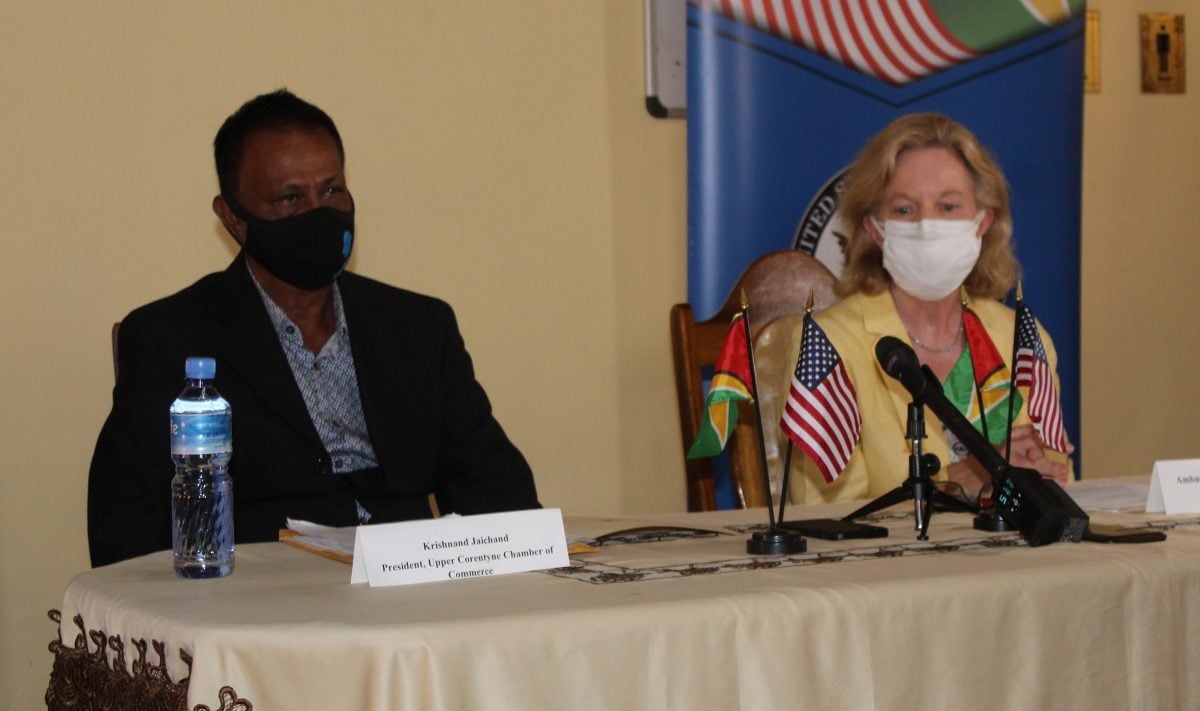United States Ambassador to Guyana, Sarah-Ann Lynch on Wednesday stressed the importance of Guyanese fisherfolk being able to profit from their hard work.
The statement was made during meetings with the Upper Corentyne fisherfolk, Upper Corentyne Chamber of Commerce & Industry, and Corriverton Mayor, to discuss issues including illegal, unreported, and unregulated fishing.
Lynch on Wednesday during a press engagement in the area said that the issue of illegal, unreported, and unregulated fishing is an important one. She pointed out, that President of the United States, Joe Biden, is really concerned about climate change, “and the issue of illegal fishing really impacts not only the environment but it impacts the global economy as well.”
According to her, approximately 26 million tons of fish is caught illegally each year, and this, she said, was money being taken out of fisherfolk’s pockets “and going into places where it shouldn’t go.”
Based on her information, fisherfolk number about 10,000 in Guyana, “It is important that they get paid appropriately and profit from their work.”
She further stressed, that it is an important area that they are looking at and hence the trip on Wednesday.
She explained that since illegal, unreported, and unregulated fishing was added to the Shiprider Agreement between Guyana and the US, it basically means that Guyanese and Americans can do joint patrolling “in the waters when they suspect there is illegal fishing or transit of illegal products… and they can work together to address those issues on the high seas and it also involves some on-the-job training at the same time.”
However, she added that they are in the early stages since the agreement was just ratified. Asked whether she was aware whether patrolling was occurring, she replied, “Yeah, they are ongoing but there have not been any arrests shall we say at this point. So it’s a great way forward for us to work together.”
Meanwhile, President of the Upper Corentyne Chamber of Commerce, Krishnand Jaichand, who was also part of the press engagement said that some of the additional issues discussed were the current ban on the export of catfish to the United States, licensing issues of fishermen in Guyana, security, and governance.
Lynch also said that she was informed that presently the catch is down, and as such fishing has been reduced.
Serious concerns were also raised about the issue of licensing of the local fishermen who ply their trade in Suriname waters and are forced to purchase a licence from Surinamese.
According to Jaichand, fishermen are presently paying US$3,000 to hold these licences which are issued to persons in Suriname, to be able to fish.
He said that he is aware that the Minister of Agriculture, Zulfikar Mustapha has been working with the authorities in Suriname to ensure that the approximately 150 Guyanese fisherfolk receive their own licences to fish in Suriname waters.





